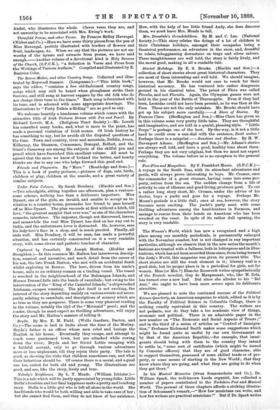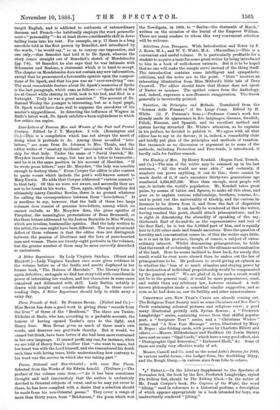In his Musical Memories (Swan Sonnenschein and Co.), Dr. William
Spark, the well-known Leeds organist, has collected a number of papers contributed to the Yorkshire Post and Musical World. The perusal of these chapters affords a striking illustra- tion of Schumann's remark,—" How few musicians can write, and how few writers are practical musicians I" But if Dr. Spark writes turgid English, and is addicted to outbursts of extraordinary German and French—he habitually employs the word personelle- meat "personality "—he at least shows considerable skill in dove- tailing loans into his text. For example, on p. 17 there is a long anecdote told in the first person by Benedict, and introduced by the words, "he would say," so as to convey one impression, and one only,—that Benedict had told it to Dr. Spark, whereas the story comes straight out of Benedict's sketch of Mendelssohn (pp. 7-8). Of Benedict he also says that he was intimate with Schumann and Brahma, a statement which it is hard to accept. The chapter on Mendelssohn does not contain any new information, except that he pronounced a favourable opinion upon the composi- tions of Dr. Spark, and that his pen was an " ever-revolving " one. The most remarkable feature about Dr. Spark's memories of Spohr is the last paragraph, which runs as follows :—" Spohr fell on the ice at Cassel while skating in 1859, took to his bed, and died in a fortnight. Truly he was a great musician." The account of Dr. Samuel Wesley the younger is interesting, but as a loyal pupil, Dr. Spark would have done well to suppress the anecdotes of his master's niggardliness. In detecting the influence of Wagner in Balfe's latest work, Dr. Spark exhibits a keen-sightedness to which few critics can aspire.







































 Previous page
Previous page